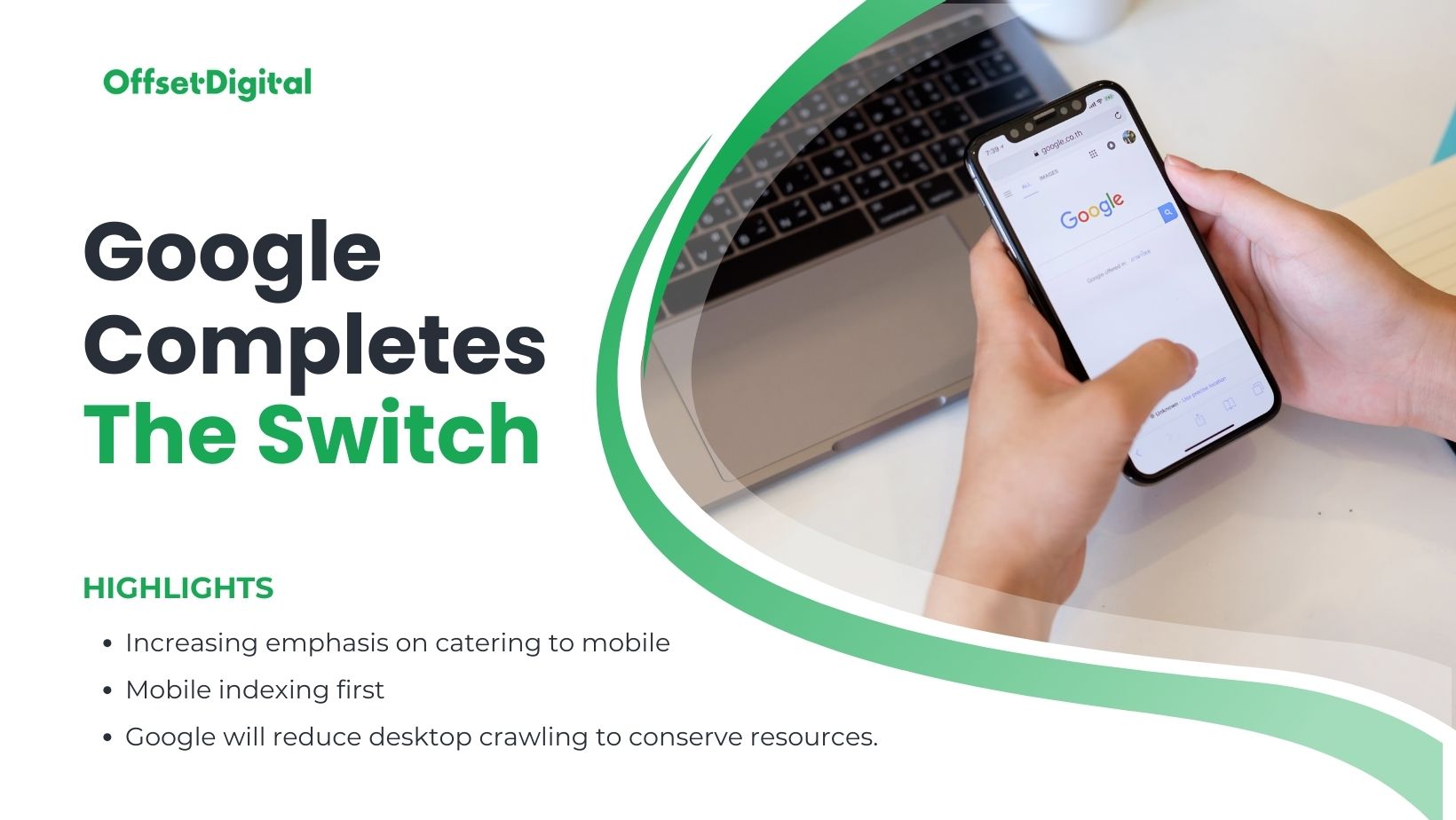Google Completes Transition to Mobile-First Indexing
In a long-awaited milestone, Google has officially concluded its migration to mobile-first indexing, reinforcing its commitment to prioritizing mobile versions during the crawling and indexing process of web content.
After Years of work, the “mobile-first” indexing for Google Search engine is complete.
In a long-awaited milestone, Google has officially concluded its migration to mobile-first indexing, reinforcing its commitment to prioritizing mobile versions during the crawling and indexing process of web content.
Google’s intensified focus on mobile devices, which commenced in 2015 with an algorithm update favoring mobile-friendly sites, has culminated in the comprehensive adoption of mobile-first indexing. This pivotal change aligns with the escalating trend of mobile web traffic, particularly in regions where mobile devices dominate internet access.
Google will continue crawling their desktop versions, albeit sparingly, as part of its efforts to conserve resources.
Prioritizing Mobile User Experience
As mobile usage surpasses desktop globally, the shift to crawling mobile versions ensures a more precise representation of what users encounter during their mobile searches. Websites have progressively adapted, rendering mobile pages as comprehensive and functional as their desktop counterparts.
Addressing Desktop-Specific Sites
While the vast majority of websites have embraced mobile optimization, a minority still face challenges in mobile functionality. For these sites, Google will continue crawling their desktop versions, albeit sparingly, as part of its efforts to conserve resources.
Evolution in Search Console and Indexing Data
As part of these transformative shifts, Google is eliminating indexing crawler data from its Search Console, recognizing that mobile crawling now encapsulates all functional sites. This change signifies the culmination of a years-long journey towards mobile-first indexing, underscoring the pivotal role of mobile devices in global internet use.
With this definitive migration completed, Google firmly establishes mobile devices as the primary gateway for users accessing the internet, marking a paradigm shift in the digital landscape.
Why Mobile Optimized Websites Help with SEO:
Enhanced User Experience:
Mobile optimization significantly improves user experience, which is a crucial factor for SEO. Studies show that 57% of internet users say they won’t recommend a business with a poorly designed mobile site, and 85% of adults believe that a company’s mobile website should be as good or better than their desktop site (Source: SWEOR). By providing a seamless and responsive interface on mobile devices, optimized sites reduce bounce rates and increase user engagement, which positively impacts SEO.
Faster Page Loading Speed:
Mobile-optimized websites tend to load faster, which is vital for SEO. Research indicates that 53% of mobile site visits are abandoned if pages take longer than three seconds to load (Source: Google). A one-second delay in mobile page load times can impact conversion rates by up to 20% (Source: Google). Google’s algorithm favors faster-loading sites, making mobile optimization a critical factor for higher search rankings.
Higher Search Engine Rankings:
Google prioritizes mobile-friendly websites in its search results. Mobile optimization is not just a matter of preference but a significant ranking factor. Sites that are mobile-responsive tend to rank higher in search results. Google has a mobile-first indexing approach, meaning it primarily uses the mobile version of a site for indexing and ranking, emphasizing the importance of mobile optimization in SEO strategies.
Local Search and Mobile Users:
The rise in mobile searches has directly impacted local search queries. Statistically, 30% of mobile searches are related to a location (Source: Google). Local businesses benefit from mobile optimization as it enhances visibility in local search results, improving their chances of appearing in the “local pack” or featured snippets.
Adherence to Google’s Best Practices:
Google’s Mobile-Friendly Test enables website owners to check if their site meets the mobile optimization standards. Adhering to these best practices demonstrates a commitment to offering a better user experience, which aligns with Google’s preferences and enhances the site’s overall SEO performance.
In summary, the statistics and impact of mobile optimization on SEO underscore the critical importance of catering to mobile users. From user experience to search rankings, mobile optimization is an essential component of successful SEO strategies in today’s digital landscape.
FAQs about Mobile Optimization and SEO:
These FAQs and answers offer insights into the importance of mobile optimization in SEO, the impact on user experience, local search, and overall website performance in search engine rankings.
Why is mobile optimization important for SEO?
Answer: Mobile optimization is crucial for SEO as it directly impacts user experience. Google prioritizes mobile-friendly websites in its search rankings. Sites optimized for mobile tend to load faster, reduce bounce rates, and enhance user engagement, all of which positively influence search engine rankings.
How does mobile page speed affect SEO?
Answer: Page speed is a critical factor in SEO. Mobile users expect faster load times, and search engines favor websites with quicker loading speeds. Research shows that a one-second delay in mobile page load times can lead to a 20% drop in conversion rates. Faster-loading pages positively impact SEO by improving user experience and reducing bounce rates.
Do mobile-optimized sites impact local search rankings?
Answer: Yes, mobile-optimized sites have a significant impact on local search rankings. A substantial percentage of mobile searches are location-based. Optimizing a website for mobile enhances its visibility in local search results, increasing the chances of appearing in the “local pack” or featured snippets, particularly beneficial for local businesses.
How can I check if my website is mobile-friendly according to Google?
Answer: Google provides a Mobile-Friendly Test tool that assesses whether a website meets mobile optimization standards. By entering the website URL into the tool, it provides feedback on the site’s mobile-friendliness and highlights areas that need improvement for better mobile user experience.
Is mobile optimization necessary for all types of websites?
Answer: Yes, in today’s digital landscape, mobile optimization is crucial for all types of websites. With the majority of internet users accessing the web via mobile devices, ensuring a seamless and responsive experience across different screen sizes and devices is essential for better user engagement and improved SEO.
How does mobile-first indexing impact website rankings?
Answer: Google’s mobile-first indexing means the search engine primarily uses the mobile version of a site for indexing and ranking. Websites that are optimized for mobile tend to perform better in search results, improving their overall visibility and rankings.
Insurance Company Transformation in Goose Creek
At Offset Digital, we collaborated with an insurance company in Goose Creek for approximately six months. Their primary focus was on commercial and equipment insurance, but our collaboration started with their desire to expand personal insurance offerings, specifically in home and auto insurance. The concerted efforts led to a significant 14% increase in organic traffic compared to February 2023. Additionally, our dedication resulted in a notable 217% surge in their focus keywords, securing top-tier positions in Google’s search results. These impressive outcomes emphasize the effectiveness of our SEO Marketing in Summerville, SC strategies.
The Bottom Line: SEO as a Critical Investment
In summary, SEO serves as a fundamental investment for businesses in Summerville, SC. It significantly impacts online visibility, web traffic, brand recognition, and the generation of qualified leads. A commitment to effective SEO strategies is vital for businesses aiming to expand and thrive in an increasingly competitive digital landscape.
Ready to Begin?
Fill out the form below and I'll get right to work.


